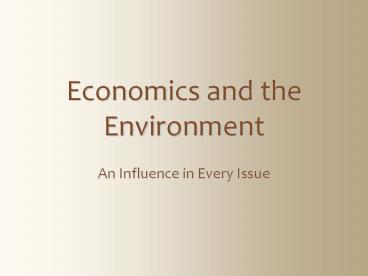Economics and the Environment - PowerPoint PPT Presentation
Title:
Economics and the Environment
Description:
... provide needs and wants Environmental economics explicitly adds trade ... economics views natural capital as only a ... export natural resources ... – PowerPoint PPT presentation
Number of Views:305
Avg rating:3.0/5.0
Title: Economics and the Environment
1
Economics and the Environment
- An Influence in Every Issue
2
(No Transcript)
3
Economics
- Economics is the social science that studies the
production, distribution, and consumption of
goods and services. (Wikipedia, 2010) - ... the science which studies human behaviour
with regard to the satisfaction of human needs
and wants from scarce resources that have
alternative uses. (Lionel Robbins, 1932)
4
What is environmental economics?
- Oikos (house, Greek) is the root for both
economics and ecology - Economics emphasizes the trade-offs in labor and
capital that come from processing raw materials
to provide needs and wants - Environmental economics explicitly adds
trade-offs based on the costs of removing raw
materials and producing waste what are we
doing with and to our house in the largest sense
5
What are the central ideas of EE?
- The global ecosystem provides a vast array of
indispensable resources and services to human
beings. - The Earths natural capital endowment is under
severe strains from rapidly increasing human
economic activity and population.
Prugh, Thomas. 1995. Natural capital and Human
Economic Survival.
6
(No Transcript)
7
(No Transcript)
8
(No Transcript)
9
(No Transcript)
10
(No Transcript)
11
Some key elements of our mainstream view of
economics
- Adam Smith (1723-1790) often viewed as founder of
modern economics - Moral philosopher concern was about social
good, moral behavior - 1776, Inquiry into the Nature and Causes of the
Wealth of Nations - Social good is the sum of individual wants, and
markets automatically guide individual behavior
to the common good (invisible hand)
12
Assumptions of early economic models
- division of labor (and value was largely a
function of labor) - all factors of production are freely mobile
- small producers would meet small consumers in
the market, having equivalent power and
information - no nuisance effects (externalities) would spill
over onto innocent bystanders
13
Neo-classical Economics
- Value free in terms of ethics descriptive
- Maximum efficiency is the outcome of market
economies (the point at which small changes
cannot make anyone better off without making
someone else worse off). - Infinite substitutability as the cost of
something (manufactured or natural) increases,
people will invent solutions (better exploitation
or substitutes) - Approach was modeled after 19th century
(Newtonian) physics - Quantitative and scientific high mathematical
rigor - Free of history and social influences (individual
wants and needs only) - no contingency
14
What are some areas that environmental economists
argue need to be improved?
- EE argue that mainstream economics views natural
capital as only a single, rather unimportant,
factor of economic production. - But, the economy is a subset of the whole world
(including ecosystems) not separate from the
global ecosystems
15
Primary components of Mainstream economics
16
Economics in the context of the natural
environment
17
What are some areas that environmental economists
argue need to be improved?
- Natural capital can be indispensable, and all
economic activity is ultimately enabled by the
natural environment (there is not infinite
substitutability) - Culture evolves in the context of the natural
environment, and cultural activities impact the
environment (the stock of natural capital) - The optimal economy is not necessarily the
largest economy - we should not measure
well-being by size
18
Measuring success
- GNP -- Gross National Product -- a standard
measure - What is not included in GNP?
- Depletion of natural capital and ecosystem
services - Value of non-market activities (e.g., homemakers)
- Externalities (pollution, congestion)
- Degree of equality in the distribution of income
- GNP can be deceptive as a measure of well-being,
especially for countries that export natural
resources
19
Example Costa Rica deforestation
- Since 1970, 30 deforestation for crops cattle
20
Economic results of deforestation
- Loss of commercial timber gt400 million
- Exposed soils eroded into oceans (2.2 billion
tons between 1970 1989) - Nutrient loss 17 of value of crops, 14 of
livestock - Fisheries declined precipitously
- Accumulated depreciation due to deforestation
was more than the average value of one year of
GDP for Costa Rica
21
What is natural capital?
- A functional definition of capital in general is
"a stock that yields a flow of valuable goods or
services into the future". - Natural capital is thus the stock of natural
ecosystems that yields a flow of valuable
ecosystem goods or services into the future.
22
Millennium Ecosystem Assessment
23
(No Transcript)
24
(No Transcript)
25
(No Transcript)
26
How can we evaluate value?
- Only scarce resources have economic value (and
it was once thought that ecosystem services were
unlimited) - Value is determined by economic agents - it is
not inherent - Related to willingness to pay but most
ecosystem services are not subject to markets - This is one reason for excessive land conversion,
pollution, etc. - Even so, social (community) values exist
27
(No Transcript)
28
(No Transcript)
29
(No Transcript)
30
Ecosystems and Human Well-being. A Framework for
Assessment. Millennium Ecosystem Assessment,
2003. p 146































